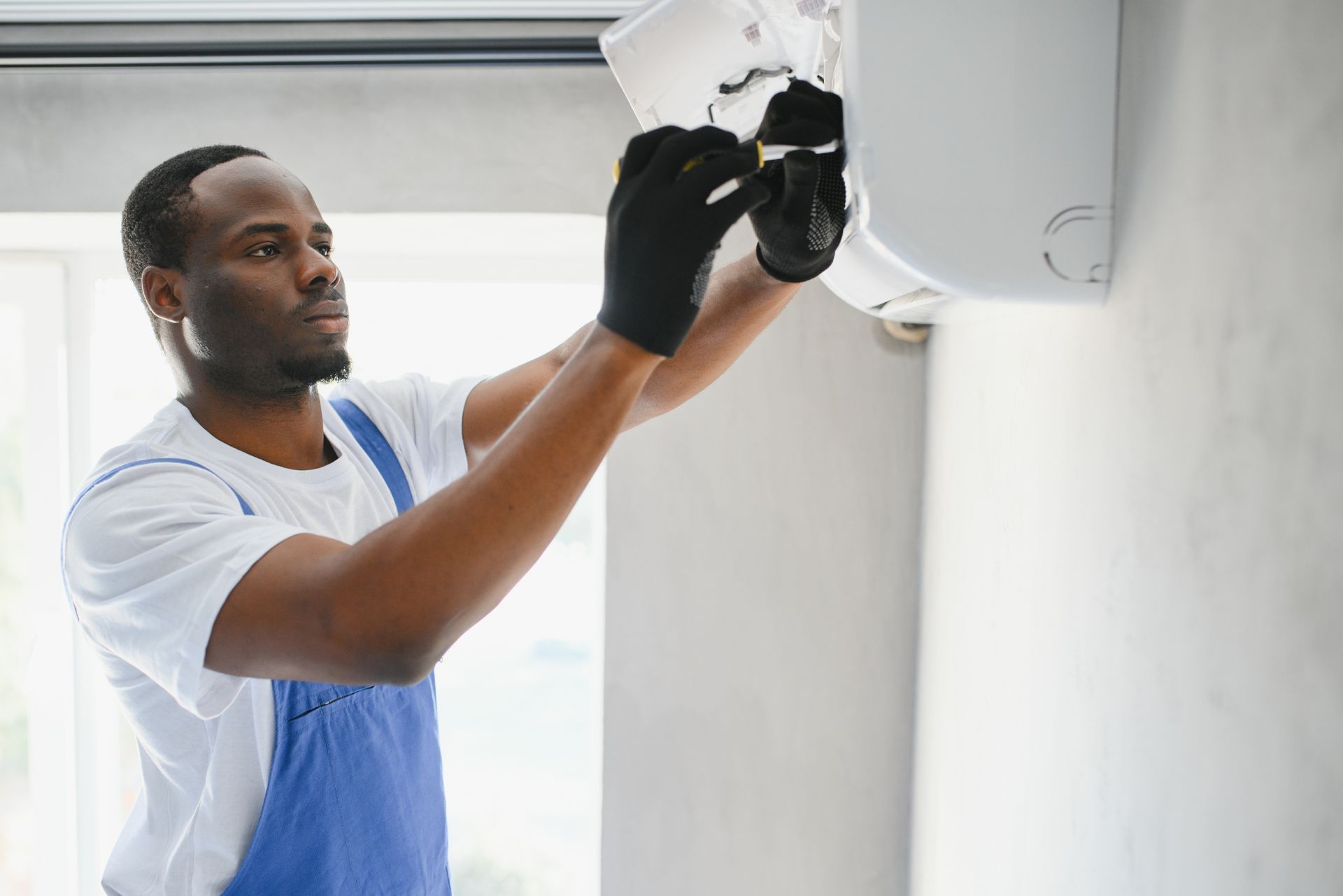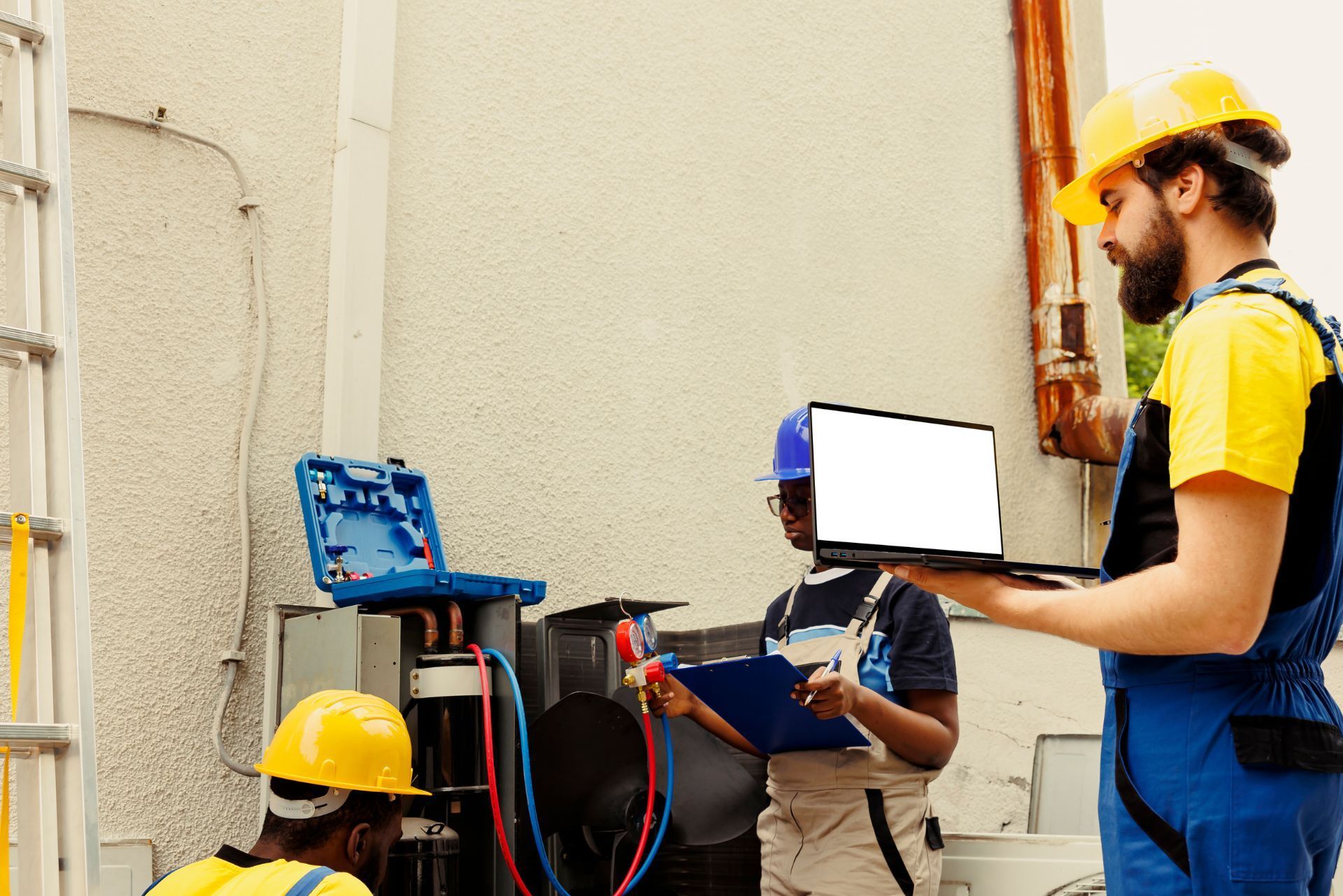Top 3 Recommended Policies

South Carolina’s HVAC contractors work in a challenging environment marked by long summers, high humidity, and frequent storms. These conditions keep the demand for skilled professionals high but also increase the risks that come with every job. From liability claims to equipment damage and employee injuries, having the right insurance coverage is essential to protect your business and maintain customer trust. This guide explains how HVAC contractor insurance in South Carolina works, the coverage types that matter most, and how to manage costs while staying compliant with state regulations. Whether you are launching a new business or managing a growing team, understanding your insurance options will help you operate safely and confidently in a competitive market.
Understanding the HVAC Industry Landscape in South Carolina
South Carolina’s HVAC market is vibrant and competitive, with 1,774 heating and air-conditioning contractor establishments operating statewide. This reflects a robust industry that supports residential, commercial, and industrial climate control needs. Greenville, in particular, stands out as a significant hub, accounting for approximately 6.29% of all HVAC contractor locations across the United States. The diversity of services offered by these contractors ranges from installation and repair to energy efficiency consultations, making them integral to the state's economic framework.
Such a concentration of contractors means that businesses must differentiate themselves not only through quality service but also through strong operational practices, including comprehensive insurance coverage. Insurance not only protects your company’s financial health but also builds trust with clients who want to work with responsible, professional contractors. Additionally, many HVAC companies are now focusing on sustainable practices, such as offering eco-friendly systems and energy-efficient solutions, which further enhances their appeal in a market that increasingly values environmental responsibility.
The Market Size and Growth Potential
With the industry expected to grow to $1.6 billion by 2025, HVAC contractors in South Carolina are positioned to capitalize on increasing demand. This growth is driven by factors such as new construction, the need for HVAC system upgrades, and ongoing maintenance requirements. However, as the market expands, so do the risks associated with running an HVAC business, making insurance coverage more essential than ever. Moreover, technological advancements are transforming the HVAC landscape, with smart home technologies and IoT-enabled systems gaining traction. These innovations not only enhance efficiency but also provide contractors with new opportunities to engage with tech-savvy consumers who prioritize modern solutions for their heating and cooling needs.
In addition to technological advancements, regulatory changes are also impacting the HVAC industry in South Carolina. The state has been increasingly focused on energy efficiency standards, which means contractors must stay informed and compliant with evolving regulations. This not only affects the types of systems they can install but also influences the training and certifications required for technicians. As a result, HVAC businesses that invest in ongoing education and certification for their staff are likely to stand out in a crowded marketplace, ultimately leading to improved customer satisfaction and loyalty.

Types of Insurance HVAC Contractors Need in South Carolina
HVAC contractors face a variety of risks, from property damage to employee injuries. To mitigate these risks, several types of insurance are typically necessary:
General Liability Insurance
General liability insurance protects your business against claims of bodily injury, property damage, and personal injury that may occur during your operations. For HVAC contractors, this coverage is critical because it can cover accidents such as a client’s property being damaged during installation or repair work.
In South Carolina, the average annual premium for HVAC liability insurance varies depending on business size. For example, a business with $150,000 in revenue might pay around $3,140 annually, but competitive shopping can reduce this to as low as $860. Similarly, businesses with $500,000 and $1 million in revenue typically pay $9,390 and $18,760 respectively, with potential reductions through careful comparison of insurance providers.
These figures highlight the importance of not only securing coverage but also actively seeking the best rates to optimize your insurance investment. For more details on liability insurance costs, ContractorNerd offers a helpful breakdown.
Workers’ Compensation Insurance
Given the physical nature of HVAC work, employees are at risk of injuries ranging from minor cuts to more serious accidents. Workers’ compensation insurance provides wage replacement and medical benefits to employees injured on the job, while also protecting employers from lawsuits related to workplace injuries.
In South Carolina, the typical cost of workers’ compensation insurance for HVAC employees is about $2,647 per employee annually. When calculated per $100,000 in payroll, the cost averages around $5,110. These costs reflect the inherent risks in the HVAC trade and underscore the importance of budgeting for this essential coverage.
Contractors should note that investing in safety training and workplace best practices can help reduce insurance premiums over time by minimizing workplace accidents. Additionally, implementing a robust safety program not only protects employees but also enhances the overall reputation of the business, potentially attracting more clients who value safety and professionalism.
Additional Insurance Considerations
Beyond general liability and workers’ compensation, HVAC contractors may also want to consider other policies such as commercial auto insurance, equipment coverage, and professional liability insurance. Each of these can address specific risks related to your operations, vehicles, or professional advice and services.
Commercial auto insurance is particularly important for HVAC contractors who rely on vehicles to transport tools, equipment, and personnel to job sites. This type of insurance covers damages resulting from accidents involving company vehicles, ensuring that both the contractor and their employees are protected while on the road. Furthermore, equipment coverage is essential for safeguarding the tools and machinery that are vital to HVAC operations, as repairs or replacements can be costly and disruptive to business continuity. Lastly, professional liability insurance can provide an added layer of protection against claims of negligence or substandard work, which can be crucial in maintaining client trust and safeguarding your business’s financial health.
How to Manage HVAC Insurance Costs in South Carolina
Insurance premiums can represent a significant expense for HVAC contractors, especially for smaller businesses or startups. However, there are strategies to manage and potentially lower these costs without sacrificing coverage quality.
Shop Around and Compare Quotes
One of the most effective ways to reduce insurance premiums is to obtain quotes from multiple insurers. Competitive shopping can dramatically lower costs. For instance, a business with $150,000 in revenue might reduce its general liability premium from $3,140 to $860 by comparing providers. Similarly, larger businesses can see substantial savings by exploring different options.
Always ensure that the coverage limits and terms are comparable when evaluating quotes to avoid gaps in protection. Additionally, consider reaching out to local insurance brokers who specialize in HVAC coverage; they often have insights into industry-specific discounts or packages that can further reduce costs. It’s also beneficial to review your policy annually, as changes in your business operations or revenue can affect your premiums and coverage needs.
Implement Safety Programs
Insurance companies often reward businesses that demonstrate a commitment to safety. Implementing comprehensive safety training, maintaining equipment properly, and adhering to OSHA guidelines can reduce workplace accidents and claims, which in turn can lower your workers’ compensation premiums.
Moreover, fostering a culture of safety within your organization not only helps in reducing insurance costs but also enhances employee morale and productivity. Regular safety drills, workshops, and incentive programs for safe work practices can create a proactive environment where employees feel valued and engaged. This commitment to safety can also improve your reputation in the industry, potentially attracting more clients who prioritize working with responsible contractors.
Maintain Accurate Payroll and Employee Records
Since workers’ compensation premiums are often calculated based on payroll, keeping accurate and up-to-date payroll records is essential. Misclassification of employees or inaccurate payroll reporting can lead to higher premiums or penalties.

Legal Requirements for HVAC Insurance in South Carolina
Understanding the legal landscape surrounding insurance is vital for HVAC contractors to remain compliant and avoid costly penalties.
Workers’ Compensation Requirements
South Carolina law requires most employers with four or more employees to carry workers’ compensation insurance. HVAC contractors must comply with this mandate to protect their employees and avoid legal consequences. Even if your business is smaller, carrying workers’ compensation insurance is highly advisable to cover any unforeseen injuries. This type of insurance not only provides financial support for medical expenses and lost wages in the event of an employee injury but also shields the business from potential lawsuits. In the high-risk environment of HVAC work, where employees may face hazards such as electrical shocks, falls, or exposure to hazardous materials, having this coverage is essential for both employee safety and business sustainability.
Licensing and Insurance
HVAC contractors in South Carolina must be licensed to operate legally, and proof of insurance is often a prerequisite for obtaining or renewing a license. This ensures that contractors have the financial backing to cover liabilities and protect their clients. Furthermore, maintaining a valid license and insurance not only complies with state regulations but also demonstrates professionalism and commitment to quality service. It is important for contractors to stay updated on any changes in licensing requirements or insurance regulations, as these can evolve and impact their ability to operate. Regularly reviewing and renewing insurance policies can help ensure that coverage remains adequate as the business grows and takes on new projects.
Contractual Obligations
Many clients, especially commercial ones, require HVAC contractors to carry specific insurance coverage as part of their contracts. Having appropriate insurance not only meets these requirements but also enhances your credibility and competitiveness in the marketplace. Clients often view insurance as a sign of reliability and professionalism, which can be a deciding factor when selecting a contractor. Additionally, certain types of projects may necessitate higher levels of coverage, such as liability insurance or professional indemnity insurance, to protect against potential claims related to design errors or equipment failures. As the HVAC industry continues to evolve with new technologies and practices, staying informed about the latest insurance trends and requirements can provide contractors with a significant advantage in securing contracts and building long-term relationships with clients.
Choosing the Right Insurance Provider for Your HVAC Business
Selecting the right insurance partner is as important as choosing the right coverage. Here are some tips to help you find a provider that meets your needs:
Look for Industry Experience
Insurance companies familiar with the HVAC industry will better understand your risks and offer tailored policies. They can also provide valuable risk management advice specific to your trade. For instance, an experienced insurer might recognize the unique hazards associated with refrigerants or the potential for equipment breakdowns, allowing them to craft a policy that adequately covers these specific risks. Additionally, they may have insights into industry trends and regulatory changes that could impact your business, helping you stay ahead of potential challenges.
Check Financial Stability and Reputation
Choose insurers with strong financial ratings and positive customer reviews to ensure they can pay claims promptly and provide reliable service. Researching third-party rating agencies, such as A.M. Best or Standard & Poor's, can provide you with a clearer picture of an insurer’s financial health. Furthermore, consider reaching out to fellow HVAC professionals for recommendations and experiences. A provider with a solid reputation in the industry is more likely to offer the peace of mind you need when unexpected events occur.
Evaluate Customer Service and Support
Responsive customer service can make a significant difference, especially when you need to file a claim or adjust your coverage. Look for providers known for their support and clear communication. It’s beneficial to assess how easy it is to reach a representative and whether they offer multiple channels of communication, such as phone, email, or live chat. A proactive insurer will also provide regular check-ins to review your policy and ensure it continues to meet your evolving business needs, which can be invaluable as your HVAC business grows.
Consider Bundling Policies
Some insurers offer discounts if you bundle multiple policies, such as general liability, workers’ compensation, and commercial auto insurance. Bundling can simplify management and reduce overall costs. Additionally, having all your policies under one roof can streamline the claims process, as you’ll be dealing with a single provider who understands your complete coverage landscape. This can also enhance your relationship with the insurer, as they will have a comprehensive view of your business operations and risks, allowing for more tailored advice and support.
Moreover, bundling can sometimes lead to enhanced coverage options that might not be available when policies are purchased separately. For example, certain insurers may offer specialized endorsements or riders that cater specifically to HVAC businesses, such as coverage for equipment breakdown or pollution liability, which can provide an extra layer of protection. By exploring all available options and discussing your specific needs with potential providers, you can ensure that you are not only saving money but also securing the best possible coverage for your HVAC business.
Conclusion: Protecting Your HVAC Business in South Carolina
As the HVAC industry in South Carolina continues to grow, contractors must prioritize insurance to protect their businesses from financial risks and legal liabilities. With nearly 2,000 establishments statewide and a market projected to reach $1.6 billion by 2025, the stakes are high.
Understanding the costs and requirements of general liability and workers’ compensation insurance is essential. By shopping around, implementing safety programs, and choosing the right insurance partner, HVAC contractors can secure the coverage they need at a competitive price.
For more information on the number of HVAC contractors in South Carolina and regional insights, explore the data available at Poidata.io’s HVAC Contractor Report.
Ultimately, well-chosen insurance coverage is not just a regulatory necessity but a strategic investment in the longevity and success of your HVAC business.
Contact Us
HVACInsure is fully licensed and permitted to sell contractor and commercial insurance in South Carolina.
We proudly serve clients throughout South Carolina and maintain partnerships with local South Carolina insurance carriers to ensure HVAC professionals receive compliant, affordable, and comprehensive coverage that meets project and regulatory requirements.
HVACInsure Focuses on South Carolina HVAC Contractor Insurance
Charleston – Columbia – North Charleston – Mount Pleasant – Rock Hill – Greenville – Summerville – Goose Creek – Hilton Head Island – Sumter – Florence – Spartanburg – Myrtle Beach – Aiken – Anderson – Greer – Mauldin – Greenwood – North Augusta – Easley – Simpsonville – Hanahan – Conway – Lexington – West Columbia
Frequently Asked Question
Common HVAC Contractor Insurance Questions in South Carolina
These FAQs address common contractor questions. As HVACInsure grows, we will update this section with real client experiences and answers.
How does South Carolina's heat and humidity affect my HVAC insurance?
South Carolina's climate demands year-round AC. We cover the high-volume work, humidity challenges, and emergency cooling repairs your business handles.
What coverage do I need for coastal South Carolina work?
The Lowcountry and Grand Strand face hurricanes and salt air. We cover the unique challenges of coastal South Carolina HVAC work.
Do I need special coverage for Charleston's historic district work?
Charleston's historic buildings have preservation requirements. We cover the liability of installing HVAC in architecturally significant properties.
What about coverage for South Carolina's manufacturing growth?
SC's manufacturing sector is growing. We cover plant work, including automotive and aerospace facility requirements.
How do South Carolina's licensing requirements affect my insurance?
South Carolina requires mechanical contractor licensing. We ensure your coverage meets LLR requirements.
Can I get coverage for both Upstate and Lowcountry work?
Absolutely. South Carolina varies from mountains to coast. We structure coverage that works across the state's different regions.

Still have questions?
Can’t find the answer you’re looking for? Please chat to our friendly team!

About The Author: James Jenkins
I’m James Jenkins, Founder and CEO of HVACInsure. I work with HVAC contractors and related trades to simplify insurance and make coverage easier to understand. Every day, I help business owners secure reliable protection, issue certificates quickly, and stay compliant so their teams can keep working safely and confidently.
Recognized by National HVAC Trade Associations
These trusted organizations set best practices and standards that carriers rely on when underwriting HVAC risks.
Membership signifies adherence to HVAC industry standards and contractor best practices.


